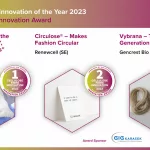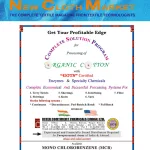Six Materials Nominated for the Innovation Award “Renewable Material of the Year 2023”
nova-Institut GmbH
Hürth, 23 March 2023
New materials will enable sustainable products in areas such as textiles, cosmetics, packaging, as well as elastic and biodegradable materials for a variety of applications. Participants at the “Renewable Materials Conference” will vote for the winners.
One way to overcome the industry’s dependence on fossil carbon is to replace crude oil and natural gas with renewable carbon within the existing structures of the chemical industry. Other ways require innovation, the development of new processes, building blocks and materials. This means a new way of thinking about chemistry and materials. Ready-to-use, fossil-free, sustainable material solutions with a low carbon footprint are in rapidly growing demand. Innovative brand owners are looking for such solutions, especially those that will soon become mainstream.
With the innovation award “Renewable Material of the Year 2023”, nova-Institute, as organiser, and Covestro, as sponsor, want to recognise particularly exciting and promising solutions that contribute to replacing fossil carbon from the ground. The call for submissions was answered by 30 companies. The advisory board and the nova experts had a hard time selecting the six most exciting and nominating them for the award.
On the second day of the “Renewable Materials Conference”, 24 May in Siegburg/Cologne (Germany), the nominated companies will present their products and all 500+ conference participants will vote for the three winners on site and online. An exciting competition for you to be a part of.
The six nominees for the “Renewable Material of the Year 2023”
Carbon-Light Yeast Oil – COLIPI (Germany)
COLIPI develops innovative bioprocesses to convert CO2 into sustainable, carbon-light alternatives to vegetable oils such as palm oil. The core innovation and enabler is a patented gas fermentation bioreactor that safely unlocks the world’s fastest CO2 using microorganisms that convert off-gases containing CO2, H2 and O2 into carbohydrate-rich biomass. This biomass and/or industrial organic side streams serve as feedstock for the yeast oil fermentation. The product consists of triacylglycerides with a composition similar to that of plants such as oil palm, consisting mainly of C16:0, C18:0 and C18:1 fatty acids. Other valuable molecules such as antioxidant vitamins, namely astaxanthin, tocopherols and other carotenoids are produced. www.colipi.com
CovationBio™ Sorona® for faux fur – CovationBio (USA)
Sorona® for faux fur is one of the first commercially available faux furs made from plant-based ingredients. It offers unlimited solutions for fashion apparel, such as jacket linings or collar trims, as well as footwear and accessories, including fur-lined shoes, earmuffs and more. Sorona® for faux fur is an exceptionally soft, natural-feeling animal fur alternative that offers warmth, design flexibility, dyeability and uncompromising durability. Sorona® for faux fur pushes the boundaries of sustainability in fashion while offering consumers an elegant, ethical option that is better for the planet. www.covationbio.com
KUORI – Bio-based and Biodegradable Elastic Materials – KUORI (Switzerland)
Kuori is developing and producing bio-based and biodegradable elastic materials based on food waste such as banana peels and nut shells. They are sustainable alternatives for conventional elastic materials in various applications. The first use case are shoe soles. This avoids the accumulation of persistent microplastics and offers an ecologic end of life perspective for the product. The new materials can be fully reintegrated into the biological cycle by industrial composting. Hence, the materials enable a circular business model for shoe producers and other manufacturers of goods. www.kuori-materials.com
Monolayer PEF Bottle: a High-Quality and Sustainable Packaging Material – Avantium Renewable Polymers (The Netherlands)
Avantium has developed a technology to convert plant sugars into FDCA, the building block of PEF: a plant-based, fully recyclable plastic with superior performance. The improved barrier properties result in longer shelf life of the packaged products. The PEF bottle offers a powerful combination of environmental attributes and superior functionality compared to conventional plastics. Due to its superior performance, PEF can also replace glass bottles, aluminium cans and multi-layer bottles. An ISO-certified life cycle assessment shows a significant improvement in carbon footprint compared to the incumbent fossil-based PET bottle. www.avantium.com
QIRA – the Next Generation of Bio-Based 1,4-butanediol (BDO) – Qore (USA)
QIRA is the next generation of 1,4-butanediol (BDO) – an easy-to-use, bio-based BDO made from annually renewable feedstocks that can reduce CO2 emissions compared to materials using fossil-based BDO. As a key platform chemical, QIRA can be used as a drop-in solution in a wide range of applications including spandex fibres, bio-based plastics and polyurethanes, serving a variety of industries including fashion, automotive, packaging and electronics. QIRA can replace the fossil-based chemical counterpart with a better sustainability performance. www.myqira.com
traceless® – Plastic-Free Natural Polymer – traceless Materials (Germany)
traceless® is part of a new generation of plastic-free natural polymer materials that go beyond bio-based or biodegradable plastics. The material is based on plant residues from the agricultural industry and contains 100 % bio-based carbon content. traceless® is a toxic-free and climate-friendly solution, emitting up to 95 % less CO2 in its manufacture and disposal than conventional plastics. And although traceless® looks and feels like plastic, it is certified plastic and microplastic free and fully bio-circular – designed to leave no trace. traceless® granulates can be used in a wide range of end products. www.traceless.eu
From 23 to 25 May 2023, the brightest stars of renewable materials will meet in Siegburg/Cologne (Germany). More than 500 participants are expected to attend the meeting point for global leaders in industry, science, and politics. The unique concept of presenting all renewable materials solutions at one event hits the mark: bio-based, CO2-based and recycled are the only alternatives to fossil-based chemicals and materials. After its successful second edition in the year 2022, the Renewable Materials Conference has established itself as one of the most important conferences for renewable materials worldwide.
All information and registration for the event is available at: www.renewable-materials.eu
Sponsor, Exhibitor and Company Events
The innovation award is sponsored by Covestro (DE), Platinum Sponsor is UPM Biochemicals (FI). Many thanks to our Gold Sponsors Alfa Laval (SE), CovationBio (US), GS Biotech (CN), iff (US), NESTE (FI), Sappi (NL/ZA), TUEV Austria (AT), Sugar Energy (CN) as well as our Bronze sponsors BASF (DE), DIN CERTCO (DE), FKuR (DE), GEA (DE), Heraeus (DE) and Sulzer (CH). Only two of the ten Gold sponsor spots are still available. Finally, we thank Borealis (AT) as the conference beer-on-tap sponsor.
Partners
The Renewable Materials Conference is supported by industry and trade associations, non- profit organisations, research institutions and interest groups, that are thematically linked to the conference: BCNP Consultants (DE), C.A.R.M.E.N. (DE), CLIB – Cluster Industrial Biotechnology (DE), European Bioplastics (EU), FNR-Fachagentur Nachwachsende Rohstoffe (DE), GO!PHA (NL), IBB – Industrielle Biotechnologie Bayern Netzwerk (DE), IN4climate (DE), ITA – Institut für Textiltechnik of RWTH Aachen (DE), kunststoffland NRW (DE), Ögut – Österreichische Gesellschaft für Umwelt und Technik (AT), Plastics Europe (DE), Renewable Carbon Initiative (DE).
nova-Institute is a private and independent research institute, founded in 1994; nova offers research and consultancy with a focus on the transition of the chemical and material industry to renewable carbon: How to substitute fossil carbon with biomass, direct CO2 utilisation and recycling. We offer our unique understanding to support the transition of your business into a climate neutral future.






